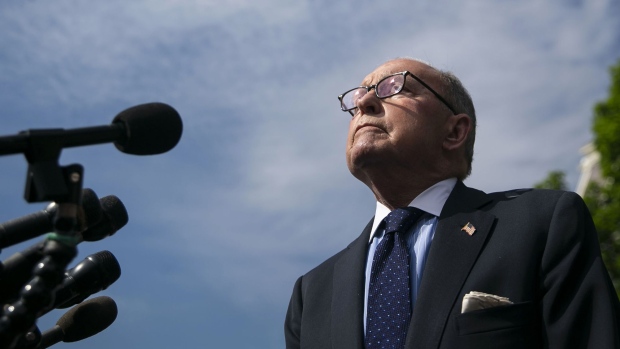Nov 1, 2019
China says got ‘consensus in principle,’ U.S. sees progress
, Bloomberg News

China and the U.S. signaled they’re getting closer to agreeing on the first phase of a deal aimed at reducing tensions in a trade war that’s slowed the global economy.
The top negotiators from the world’s two largest economies -- China’s Vice Premier Liu He, U.S. Treasury Secretary Steven Mnuchin and U.S. Trade Representative Robert Lighthizer -- talked by phone Friday and both sides released statements describing the call as “constructive.”
“We’re moving along with the deal with China,” President Donald Trump told reporters at the White House on Friday. “China wants to make the deal very much.”
The Chinese Ministry of Commerce said they achieved a “consensus in principle,” while the U.S. offered a slightly more cautious assessment of the negotiations -- citing progress and saying working-level talks would continue.
“They made progress in a variety of areas and are in the process of resolving outstanding issues,” the USTR said in a statement.
A spokesman for the USTR declined to confirm China’s characterization that a consensus had been achieved in core areas, but earlier in the day White House economic adviser Larry Kudlow said that negotiators were nearing an agreement on a number of fronts.
Stocks rose to fresh records Friday amid signs of a breakthrough and after a report showing stronger-than-expected job growth in the U.S.
If phase one is completed, it could give Trump a lift heading into his 2020 re-election bid. The U.S. economy has shown signs of slowing as businesses hold back investments amid uncertainty over the impact of tariffs on hundreds of billions of Chinese goods.
But whether the talks go beyond this initial phase, which Trump said was 60 per cent of a broader deal he’s seeking, remains a big unknown. Chinese officials are casting doubts about reaching a comprehensive long-term trade deal with the U.S. even as the two sides close in on the phase one agreement, Bloomberg reported this week.
Adding to the complexity of the relationship between the two countries, the World Trade Organization earlier Friday awarded China permission to impose US$3.6 billion in sanctions against the U.S. The case predates the tariff war between the two nations but may add a layer of tension to ongoing talks.
Tariff Question
Kudlow told reporters earlier Friday that negotiators are close to finishing details of the pact on China’s increased purchases of U.S. agriculture products, currency stability and opening of financial services markets to American firms. They’ve also made “excellent progress” on the issue of intellectual property theft, he said. Disputes around so-called forced tech transfer will likely not be resolved until a possible phase two of the deal.
Kudlow also left open the possibility of additional tariffs on Chinese goods as talks continue. China wants Trump to cancel a new wave of import taxes due to take effect Dec. 15 on American consumer favorites such as smartphones and toys as part of the phase one deal.
“They’re still on the table until this phase one deal is completed, or worst case not completed,” Kudlow said in an interview on Bloomberg Television. “The president has hinted, depending on the process of phase one, he may be willing, I say may be willing, to take a look at those tariffs.”
Trump’s approach to China disrupted many businesses and emerged as a drag on growth in both the U.S. and global economies. Because of that any deal he concludes with China will come under scrutiny at home going into an election year.
Aligning With Allies
House Speaker Nancy Pelosi told Bloomberg reporters Friday that Democrats would be tougher on China than Trump -- by aligning with the European Union to pressure China for reforms.
Pelosi said the U.S. needs to be more “strategic,” moving beyond using tariffs as a primary weapon and instead engaging allies like the EU in its efforts.
“You have to be more comprehensive in how you do that and how you also engage other countries,” she said at the Bloomberg headquarters in New York. “It has to be more comprehensive so that China knows they can’t do this anymore.”
The U.S. and China hit a hurdle this week when Chile canceled an upcoming summit where the leaders of the two countries planned to meet and sign a deal -- if reached. The teams have been looking at other locations in recent weeks as demonstrations that caused the cancellation escalated in Chile, Bloomberg has reported.
